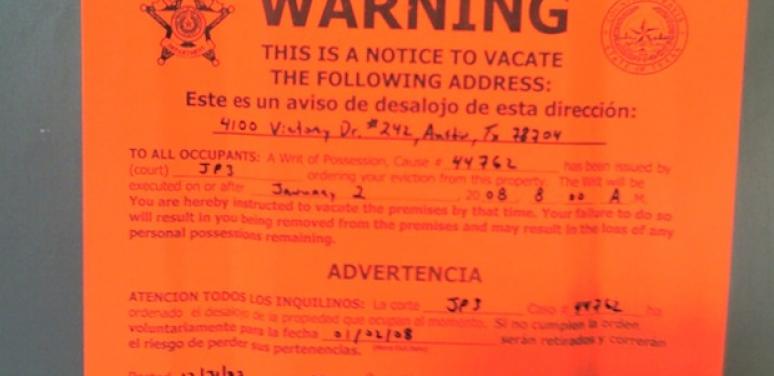A Guide To Evictions

Eviction is the removal of a tenant from rental property by the landlord. This guide will help you understand your rights and options as a tenant.
What happens when you violate a lease or landlord-tenant code
Most leases include rules and promises by the tenant. Some examples are:
- a promise to not make noise that disturbs the neighbors
- or a promise not to run a business out of the house without the landlord’s permission.
The Landlord-Tenant Code also includes rules that are made a part of all leases automatically, even if the lease is not written down. Some of these are:
- a promise to keep the property clean and safe, and
- a promise not to damage or destroy any part of the property.
If you break one of these rules or promises, the landlord can go to court to have you evicted. To do so, the landlord must first give you a letter that does the following:
- explain what rule you have broken
- and what you are doing wrong,
- give you at least 7 days to correct the problem (not 5 days as when rent is late),
- tell you that if the problem is not corrected by the deadline, the landlord may terminate the lease
- and go to court to have you evicted,
- warn you that if the same rule is broken again within 1 year, the landlord can go directly to court without giving a new notice.
If you do not fix the problem, or if you fix it and break the same rule again within 1 year, your landlord can take you to court to have you evicted. Please remember that this is only general information. It may not apply to your specific situation.
What happens when your landlord takes you to court
If your landlord has gone to court to evict you, the court will notify you and tell you when and where to go to court. You will be notified in one of two ways:
By certified mail, return receipt requested
If you get a card from the Post Office telling you to pick up some certified mail, GET IT! If you do not, the court will evict you anyway and you will not get a chance to defend yourself.
By Constable
A Constable will try to deliver the notice to you in person. If you are not home, he will tape it to your door. If you get a notice telling you to go to court, DON’T IGNORE IT. Normally, the court date will be 2 to 4 weeks after the date your landlord files his case. (It can be more or less.) The date depends on how busy the court is. On the court date, be sure to go to court early. There will be a trial in front of a judge. Both you and the landlord will have a chance to tell their side of the story.
If you do not go to court, your landlord will win. If you are late, the court will go ahead without you, so get there early.
I just received an eviction notice. What should I do?
ACT FAST!
The 24 hour eviction notice means that the Constable will be back in a minimum of 24 hours. If you are still there, he will make you leave. The constables only work during daylight hours, Monday through Friday. So, if the 24 hour notice is posted on Friday, you will have at least until Monday morning. If you do not have all of your belongings out of the house by the time the Constable comes back, you will have to leave them behind. The landlord can remove your belongings and store them or leave them where they are for 7 days. If the landlord wants to, he can charge you for storing your property. If, at the end of 7 days, you have not claimed your property, the landlord can do whatever he wants with your property including keep it, sell it, or leave it on the street. He cannot hold your property hostage until you pay the rent but he can ask for his storage costs.
What are the common reasons a landlord can legally evict a tenant?
The common reasons a landlord can legally evict a tenant are:
- Failure to pay rent
- Violating an important part of the lease or the Delaware Landlord-Tenant Code
- Holding-over (staying after the lease ends without permission)
- Conviction of a Class A misdemeanor or felony that threatens person or property
What are the common reasons a landlord can never evict a tenant?
A landlord can never evict a tenant for the following reasons:
- Race
- Religion
- Sex
- Marital status
- National origin
- Disability
- Age
- Occupation
- The tenant has children
- The tenant complained about problems in the apartment or house
What are some things that a landlord can never do to evict me?
To evict you, a landlord can never:
- Change the locks without getting a court judgment against you first.
- Turn off the electricity, gas, or water.
- Take any of your property.
- Threaten to hurt you or anyone else if you don’t pay.
What can happen if I fail to pay the rent?
If you do not pay the amount of rent that is due every month, the landlord can go to court to evict you. To do so, the landlord must first send you a letter stating that unless all of the rent due is paid, the landlord will terminate the lease and take you to court. The letter must set a deadline giving you at least 5 days to pay. This letter is often called a "Five Day Letter."
Then, if you do not pay in full or move out by the deadline, the landlord can go to Justice of the Peace Court and file a case asking for the rent money and to have you evicted. Remember that the amount of money you owe could include late fees and back rent from previous months. The law allows the landlord to ask you to pay all of it or be taken to court.
Can a landlord evict me if I am convicted of a misdemeanor or felony?
If you (or a family member living on the premises) is convicted of a class A misdemeanor or a felony while living in the house or apartment and the conduct that led to the conviction caused or threatened to cause irreparable (unfixable) harm to any person or property, the landlord can immediately terminate the lease and go to court for an eviction. In this situation, the landlord does not need to warn you with a letter.
If I received an eviction notice, can I make a deal with my landlord?
If you want make a deal or payment arrangement with your landlord, try to get it in writing and be sure you understand exactly how much you must pay and when. A court judgment for back rent will usually include interest and court costs, so you may owe more money than you expect. Unfortunately, your landlord is not required to make a deal with you or accept a payment plan. He might want all his money immediately.
What is "holding-over" ? Can a landlord evict me for "holding-over"?
For people that rent month to month, with no set ending date for when you must leave, the landlord can end the lease by giving you, at least, 60 days written notice. If you have a lease with an ending date, the landlord must tell you 60 days before the lease ends, in writing, that he will not be renewing the lease. Otherwise, after the ending date, it continues month to month.
If the landlord has notified you that the lease will not be renewed, then you must move out by the last day of the lease.
If you do not move out, then you are "holding-over" and the landlord can go to court and seek to have you evicted. The landlord does not need to give any additional warning or notices. The notice that the lease would not be renewed is enough.
If you lose in court, the law says that you can be ordered to pay double your daily rent as a penalty until you move out.
